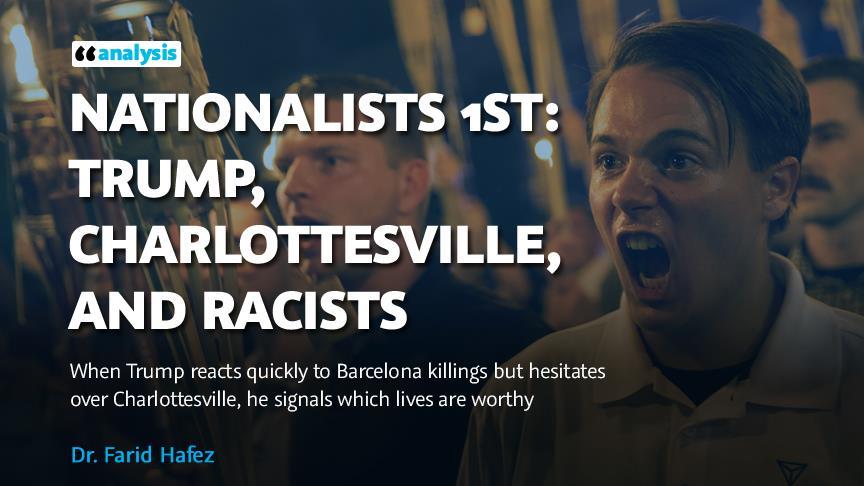
Nationalists 1st: Trump, Charlottesville, and racists
Donald Trump successfully drew on the many success stories of right-wing populist parties in Europe to win the elections and become president of the United States of America. He used a slogan that has been popular in Europe’s plagued history of right-wing populist parties.
In France, the National Front has been campaigning with the slogan “France First” for a long time. And its support has since increased. Thus, numerous right-wing parties followed suit.
In many cases, the turn to an exclusive nationalism often meant abandoning a cruder form of racism.
So, “Austria first,” for example, implied stopping speaking about the “Germanic volk” and the Third Reich.
Therefore, the “nation first” attitude became a way of introducing a type of nationalism seemingly disconnected from older forms of racism; less obvious, less blatant, and seemingly more “civilized”.
Nevertheless, all these European parties’ attempts to keep away from open racism never fully materialized.
Anti-Semitic and anti-Black racism repeatedly surfaced in its classical forms.
Even though the new strategy of most Western European right-wing populist parties is to distance themselves from anti-Semitism, anti-Semitic statements by their representatives in various ranks are commonplace.
Ultimately, most of these parties, such as the Swiss Democrats or the Austrian FPÖ, are historically linked to fascist and Nazi parties. And although they attempt to project their own fascism on the new “other” in Europe — Muslims, that is — by inventing the word “Islamofascism,” their own racism resurfaces again and again.
So this trend seems to be the case with Trump now. Many commentators felt astonished by the Charlottesville rally, where white supremacists, the KKK, which many considered to be dead already, and the so called “alt-right” marched together.
But the success of the “America first” policy restored their consciousness, which many of them seemed to have lost under the preceding centrist politicians of the Republicans, and especially under the first black president, Barack Hussein Obama, who represented not only the loss of the white man, but also the humiliation of the white supremacists.
Trump, the candidate, relied heavily on those sectors of society who felt convinced that the liberal, libertarian, and leftist camp did not represent them.
When he spoke of “both sides” being responsible for the violence in Charlottesville, he actually did nothing but become the voice of those on the right that would not have anyone speak for them in the past.
It is them and their “real news,” represented by such media outlets as Breitbart, that he speaks for. He speaks for his electorate and those who want (white) America to be first again. He is the voice of the ultra-right, which acts as if it were alternative and new, but in essence, it is as racist and “classical” as the KKK.
And it is the same racist fulfillment that we witness in so many European countries. Like the former KKK “grand wizard” David Duke put it blatantly, for him, the Neo-Nazi rally in Charlottesville means “the fulfillment of President Donald Trump’s vision for America” designed to give the country back to whites.
One may, on the other hand, argue that Donald Trump is just a necessary means to many in the U.S. to realize that they live in a seemingly progressive enclave that ignores the broader U.S. society.
Maybe it was necessary for many liberals and leftists to realize what the other groups in the country think and feel, and how deeply racism is entrenched in the U.S. society, and more importantly, that racism can actually be found in their midst, too.
To take one example: After Iraq was bombed and after the emergence of the terrorist militia Daesh caused millions of people to flee from Iraq and Syria — where the influence of Daesh kept spreading — the U.S. under Barack Obama was more than hesitant to accept refugees.
While German Chancellor Angela Merkel was celebrated for opening the borders, little critique was heard from the liberal and leftist political camps in the U.S. towards the restrictive policies of their government.
Whereas today thousands of people take to the streets to protest Trump because of his open support of racists, which is an easy task to accomplish.
But it is much more difficult to criticize a black president for upholding white supremacy through the private prison-industrial complex or other institutions that are deeply colored by racist structures.
What is needed in such a crucial moment on the part of the liberals and leftists is self-criticism.
This way, Trump may actually become an opportunity for all of the anti-racist forces in the U.S. society and for a better America: an opportunity to challenge the deeply entrenched racism in their history.
Click here to read the original article.

 Search
Search